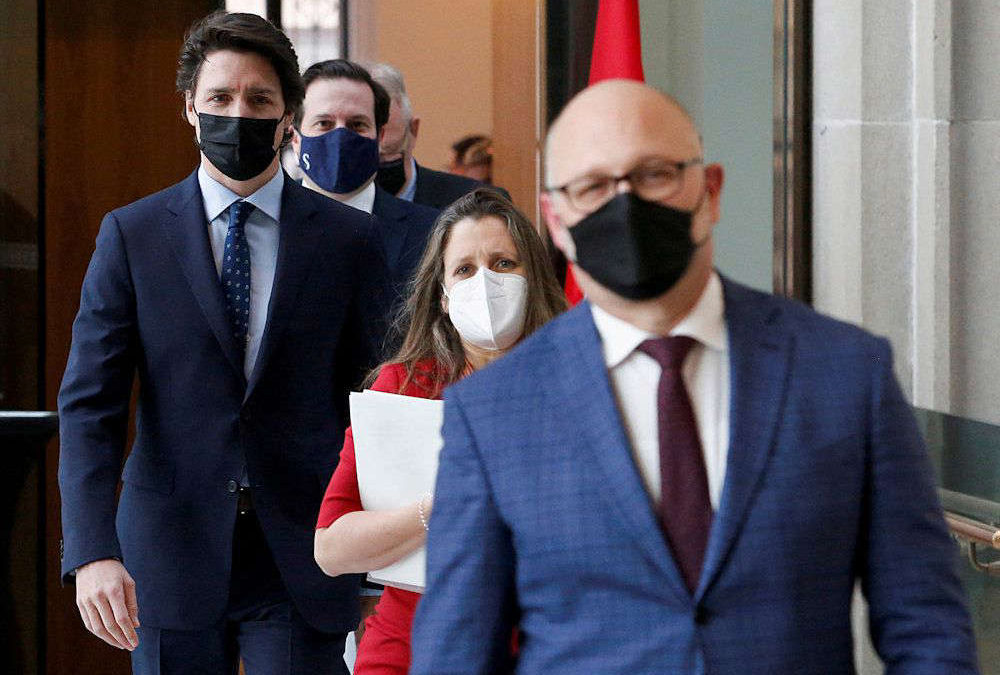意见:不能这么快就忘记找到坟墓的事
《第一阅读》是由《国家邮报》的特里斯坦•霍珀(Tristin Hopper)策划的一份每日通讯,让你了解加拿大政界人士的艰难处境。
2022年2月23日,加拿大总理贾斯廷·特鲁多、司法部长大卫·拉梅蒂、副总理克里斯蒂亚·弗里兰和公共安全部长马尔科·门迪西诺合影。©2022年2月23日,加拿大总理贾斯汀·特鲁多、司法部长大卫·拉梅蒂、副总理克里斯蒂亚·弗里兰、公共安全部长马尔科·门迪奇诺提供。
注:就在本刊付印后不久,加拿大总理贾斯廷·特鲁多(Justin Trudeau)突然取消了他的政府对《紧急状态法》的使用。这是一件很奇怪的事,因为两天前才对这个问题进行信任投票,同时又声称威胁仍然存在,而且证据很少。
加拿大并不是唯一一个遭遇“自由护卫队”规模的大规模反授权抗议活动的国家。就在一个月前,法国有超过10万人走上街头,抗议法国总统埃马纽埃尔·马克龙采取的新冠肺炎措施。就在去年11月,布鲁塞尔和鹿特丹还发生了暴力骚乱。数十名反授权示威者在新西兰议会的草坪上安营扎营的时间几乎和“自由车队”在渥太华安营扎营的时间一样长。
但只有加拿大政府认为应对反授权的骚乱是合适的,即给予自己近乎前所未有的紧急治安权力。这就是为什么贾斯廷·特鲁多总理的紧急状态法如此迅速地引起了世界的注意——而且通常不是以一种好的方式。下面,我们就来快速了解一下这个决定在国外是如何引起共鸣的。
1月2日,阿姆斯特丹发生大规模(且被禁止的)反授权抗议活动。尽管出现了很多这样的情况,但荷兰从未认为在没有司法监督的情况下开始冻结公民的银行账户是合适的。1月2日,阿姆斯特丹发生了大规模(且被禁止的)反授权抗议活动。尽管出现了很多这样的情况,但荷兰从未认为在没有司法监督的情况下开始冻结公民的银行账户是合适的。
本周,《华尔街日报》(The Wall Street Journal)称,即使在所有卡车司机的封锁都被清除之后,特鲁多仍保留着紧急权力,这是“自由主义暴政”。“现代自由主义者可以不动声色地从放纵的宽容一跃到镇压,”该报编委会写道。“加拿大总理贾斯廷·特鲁多夸大了这一趋势。”
美国风险投资家大卫·萨克斯是PayPal的创始首席运营官。萨克斯在《纽约时报》(New York Times)前专栏作家巴里•韦斯(Bari Weiss)策划的时事通讯《常识》(Common Sense)的一篇文章中警告称,加拿大在没有监管的情况下“反乌托邦”地利用《紧急情况法案》(Emergencies Act)冻结银行账户,这可能是对美国未来吸引力的预演。他写道:“这是西方版的中国社会信用体系,它并没有完全禁止不同政见,但使其代价高昂,对普通公民来说变得不切实际。”
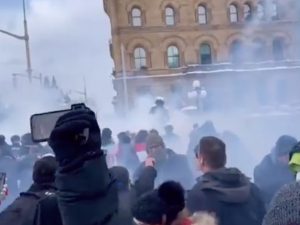
《滚石》(Rolling Stone)的政治专栏作家马特·泰比(Matt Taibbi)在Substack上写道,加拿大正走在通往“官僚主义反乌托邦”的快车道上。他的专栏标题为“当无聊的人变成危险的时候”,他特别针对的是加拿大财政部长克里斯蒂娅·弗里兰(Chrystia Freeland)。和泰比一样,弗里兰在上世纪90年代曾是一名驻俄罗斯的记者。泰比谴责她的《紧急情况法》命令中对金融体系的“科幻”反乌托邦主义,并重复了她的一位前外国记者同时代人创造的反弗里兰的抨击:“新世界秩序的护士长。”
外国评论家似乎无法接受这样一个事实:加拿大现代史上最狭隘的行动之一,是由该国“自由党”的领导人发起的。在英国,《每日电讯报》专栏作家乔安娜·威廉姆斯最近谴责加拿大政府“极端狭隘”的行为,称加拿大政府将特鲁多视为一个“不安全的威权主义者”。“想象一下,如果回到2020年,特朗普总统冻结了“黑人的命也是命”(Black Lives Matter)运动关键人物的银行账户,会有多大的骚动,”她写道。
《纽约时报》是最令人惊讶的外国出版物之一,它把自己的命运和卡车司机放在了一起——或者至少是卡车司机抗议的权利。《纽约时报》编委会写道:“我们不同意抗议者的诉求,但他们有权吵吵嚷嚷,甚至制造混乱。”《纽约时报》的记者经常站在世界各地的示威游行的前线,该报还对数千名卡车司机在某种程度上对加拿大民主构成威胁的说法泼了冷水。他们写道:“按照世界各地大规模抗议活动的标准,在渥太华市中心咆哮的‘自由车队’令人讨厌。

《华盛顿邮报》是支持特鲁多实施《紧急状态法》的少数几家外国媒体之一。在封锁被清除之前发表的一篇社论中,该报编委会表示,特鲁多“清楚地了解”他的紧急命令的严重性,对“坚决破坏文明社会的限制”的抗议者使用高压手段是正确的。
这是一名Coastal GasLink公司的员工在他的卡车驾驶室里拍摄的视频截图。视频显示,在2月17日一起针对该公司在不列颠哥伦比亚的一个工作营地的协调袭击中,身穿白衣的人拿着斧头。几分钟后,袭击者包围了卡车,用大功率灯弄瞎了司机的眼睛,然后用斧子、照明弹和喷漆破坏了汽车。
前总理斯蒂芬·哈珀(Stephen Harper)在过去7年里一直非常努力地保持自己的政治观点。这就是为什么哈珀显然威胁要从他的政治睡眠中醒来,只要足够长的时间就可以摧毁让·查雷斯特,这是值得注意的。周三,《La Presse》援引一位保守党消息人士的话称,如果沙雷特竞选保守党领袖,哈珀不会“袖手旁观”。另一位不愿透露姓名的哈珀助手补充说:“老板认为让·夏雷不是一个真正的保守派。”
说到Jean Charest,《国家邮报》的专栏作家Sabrina Maddeaux提醒保守党,这位前魁北克省省长并不是和平抗议的坚定拥护者,而和平抗议显然已经成为保守党最喜欢的议题。就在10年前,沙雷通过一项省级法律——《第78号法案》(Bill 78),对不断出现的封锁和街头抗议做出了回应。就镇压和平集会的程度而言,该法案与《紧急情况法》(Emergencies Act)相差不远。不过在那起案件中,目标是学生而不是卡车司机。
“自由护航队”事件带来的一个启示是,有相当多的加拿大人不知道自己的政府是如何运作的。上周有两个特别值得注意的例子:
上周末,美国国防部接到了300多个来自自由护卫队支持者的电话,要求加拿大武装部队动员起来,保护抗议者免受警察的袭击。

同样,总督玛丽·西蒙也接到了很多要求解雇总理的电话,以至于里多·霍尔(Rideau Hall)觉得有必要发表一份官方声明,指出王室不会仅仅因为有足够多的人要求就解散政府。
我们担心写女王也不会让政府解散。©Rideau Hall我们担心写信给女王也不会让政府解散。
就在几天前,皇家骑警还公开声称,只有“自由护卫队”的直接参与者的财务生活才会因《紧急情况法》而受到冻结。因此,当财政部(Department of Finance)的一名工作人员周二告诉下议院(House of Commons)的一个委员会,任何在2月15日之后向抗议活动捐出哪怕是象征性的一笔钱的人,都可能面临金融炼狱的命运时,人们有点吃惊。助理副部长伊莎贝尔·雅克(Isabelle Jacques)表示,这“非常不可能”,但仍有可能。
在渥太华市议会自“自由护卫队”解散后的第一次会议上,官员们投票决定将情人节推迟到3月14日。在真正的情人节那天,城市里不断响起的喇叭声显然太不浪漫了,需要一个替代的日期。
自由车队并不以他们对媒体的热爱而闻名(在不列颠哥伦比亚省,据说他们中的一些人甚至向记者吐口水)。但在安大略的阿恩普莱尔,有一个温馨的时刻。,一名戴着“解除CBC基金”帽子的自由护卫队停下来拯救一辆被困在沟里的CBC小型货车。加拿大广播公司记者阿什利·伯克说:“他说他永远不会让任何人陷入这样的困境。”
(上面是参考译文,以下是原文)
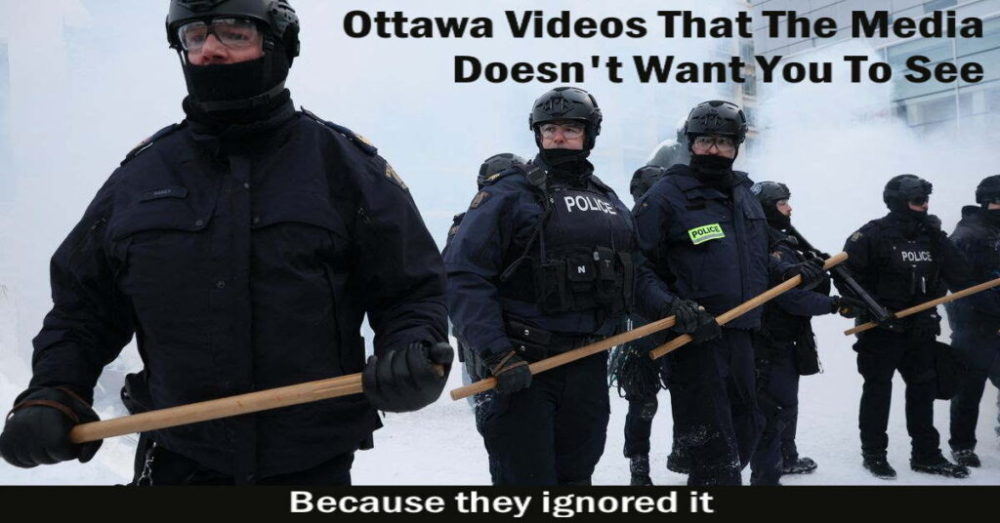
Opinion: Grave recoveries must not be forgotten so quickly
First Reading is a daily newsletter keeping you posted on the travails of Canadian politicos, all curated by the National Post’s own Tristin Hopper.
Prime Minister Justin Trudeau, Minister of Justice David Lametti, Deputy Prime Minister Chrystia Freeland, and Minister of Public Safety Marco Mendicino pictured on February 23, 2022. © Provided by National Post Prime Minister Justin Trudeau, Minister of Justice David Lametti, Deputy Prime Minister Chrystia Freeland, and Minister of Public Safety Marco Mendicino pictured on February 23, 2022.
NOTE: Just after this newsletter went to press, Prime Minister Justin Trudeau suddenly revoked his government’s usage of the Emergencies Act. Which is a … weird … thing to do after putting the issue to a confidence vote just two days before, while also claiming with minimal evidence that a threat still existed.
Canada isn’t the only country to have faced huge, disruptive anti-mandate protests on the scale of Freedom Convoy. Just a month ago, France saw more than 100,000 people take to the streets in protest of COVID measures imposed by French President Emmanuel Macron. Violent riots were hitting Brussels and Rotterdam as recently as November. Scores of anti-mandate desmonstrators have been camped out on the lawns of the New Zealand Parliament for almost as long as Freedom Convoy was ensconced in Ottawa.
But only Canada’s government has seen fit to respond to anti-mandate unrest by giving themselves near-unprecedented levels of emergency policing powers. This is why Prime Minister Justin Trudeau’s invocation of the Emergency Act so quickly grabbed the world’s attention – and often not in a good way. Below, a quick look at the how the decision has resonated abroad.
A massive (and prohibited) anti-mandate protest seen in Amsterdam on Jan. 2. Despite any number of scenes like this, the Netherlands never saw fit to start freezing the bank accounts of its citizens without judicial oversight.© Photo by Sanne Derks/Getty Images A massive (and prohibited) anti-mandate protest seen in Amsterdam on Jan. 2. Despite any number of scenes like this, the Netherlands never saw fit to start freezing the bank accounts of its citizens without judicial oversight.
This week, The Wall Street Journal declared it “ liberal tyranny ” that Trudeau was holding on to emergency powers even after every single trucker blockade had been cleared. “ Modern liberals can hurtle from extravagant tolerance to suppression without batting an eye ,” wrote the paper’s editorial board. “Canadian Prime Minister Justin Trudeau dramatizes the tendency.”
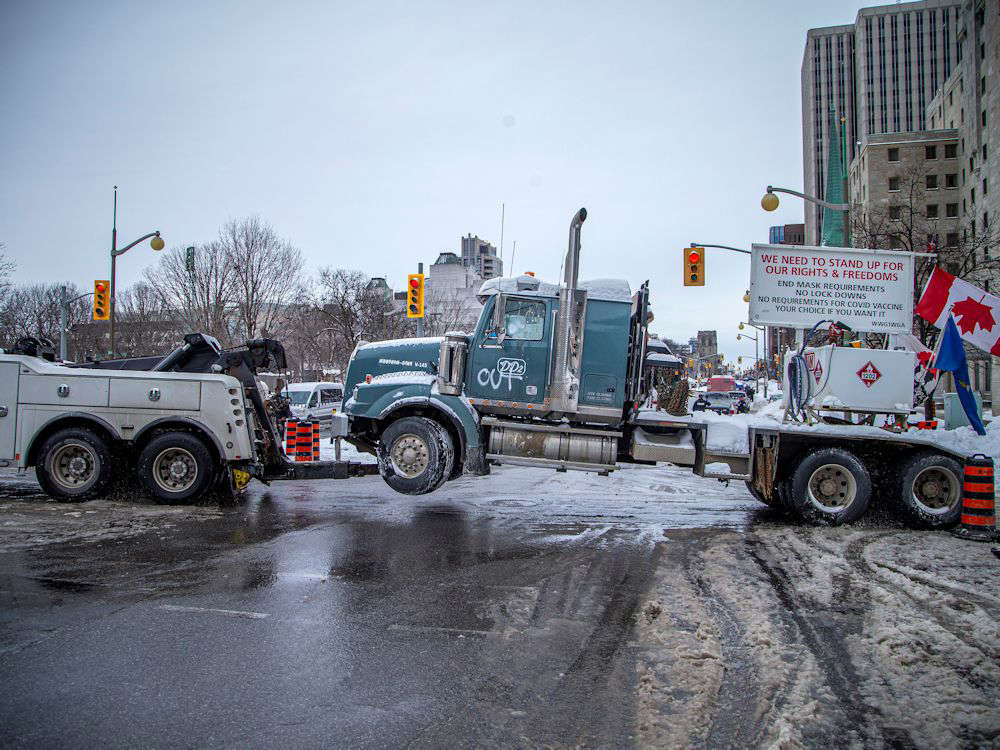
U.S. venture capitalist David Sacks is the founding COO of PayPal. In a write-up for Common Sense, a newsletter curated by former New York Times columnist Bari Weiss, Sacks warned that Canada’s “dystopian” usage of the Emergencies Act to freeze bank accounts without oversight could be a preview of coming attractions for the United States . “It’s a Western version of China’s social credit system that does not altogether prohibit political dissent but makes it so costly that it becomes impractical to the ordinary citizen,” he wrote .
Matt Taibbi, the political columnist for Rolling Stone, wrote on his Substack that Canada was on the fast track to “bureaucratic dystopia.” Titling the column “when boring people turn dangerous” he took particular aim at Canadian Finance Minister Chrystia Freeland who, like Taibbi, was an expat journalist in 1990s Russia. Decrying the “sci-fi” dystopianism of her Emergencies Act orders against the financial system, Taibbi repeated an anti-Freeland slam coined by one of her former foreign correspondent contemporaries: “The Nurse Ratched of the New World Order.”
Foreign critics can’t seem to get over the fact that one of the more illiberal actions in modern Canadian history has been initiated by the leader of the country’s “Liberal” party. In the U.K., Telegraph columnist Joanna Williams recently denounced the “monstrously illiberal” behaviour of Canada’s government , saying it speaks to Trudeau as an “insecure authoritarian.” “Imagine the uproar if, back in 2020, President Trump had frozen bank accounts belonging to key figures in the Black Lives Matter movement,” she wrote .
The New York Times was one of the more surprising foreign publications to throw in their lot with the truckers – or at least, the truckers’ right to protest. “We disagree with the protesters’ cause, but they have a right to be noisy and even disruptive,” wrote the Times editorial board. As a publication whose reporters are constantly at the front lines of demonstrations around the world, the Times also threw cold water on the notion that a few thousand truckers were somehow a threat to Canadian democracy. “ By the standards of mass protests around the world, the ‘Freedom Convoy’ snarling Downtown Ottawa ranks as a nuisance ,” they wrote.
The Washington Post has been one of the few foreign outlets to endorse Trudeau’s invocation of the Emergencies Act . In an editorial published before the blockades were cleared, the paper’s editorial board said Trudeau “clearly understands” the gravity of his emergency orders, and was right to use a heavy hand on protesters “engaged in a resolute effort to play havoc with the strictures of civilized society.”
A screenshot of a video shot by a Coastal GasLink employee from the cab of his truck showing white-clad figures armed with axes during a coordinated Feb. 17 attack on one of the company’s B.C. work camps. Moments later, the attackers surrounded the truck, blinded the driver with a high-powered light and then damaged the vehicle with axes, flares and spray paint.© RCMP A screenshot of a video shot by a Coastal GasLink employee from the cab of his truck showing white-clad figures armed with axes during a coordinated Feb. 17 attack on one of the company’s B.C. work camps. Moments later, the attackers surrounded the truck, blinded the driver with a high-powered light and then damaged the vehicle with axes, flares and spray paint.
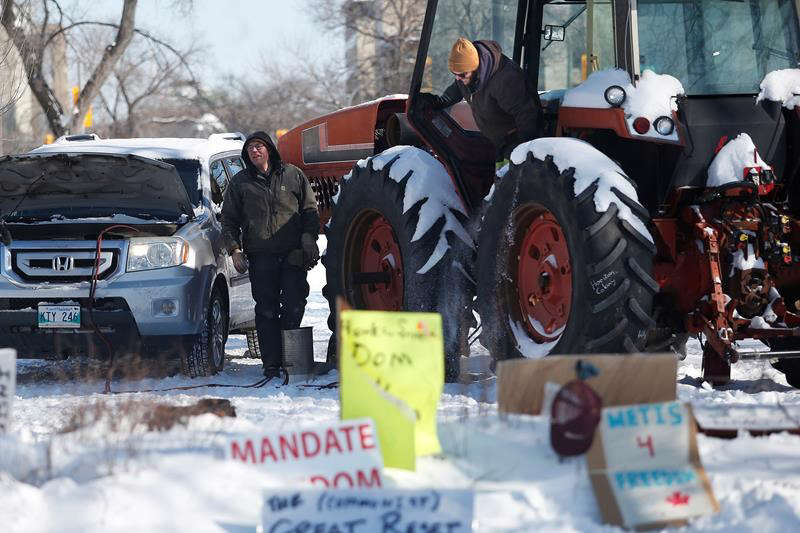
IN OTHER NEWS
Former prime minister Stephen Harper has spent the last seven years being rather diligent about keeping his political opinions to himself. Which is why it’s notable that Harper has apparently threatened to emerge from his political slumber just long enough to destroy Jean Charest . On Wednesday, La Presse quoted a Conservative source in saying that Harper would not “sit with crossed arms” if Charest ran for the Conservative leadership. Another unnamed Harper acolyte added that “the boss is of the opinion that Jean Charest is not a real conservative.”
Speaking of Jean Charest, here’s National Post columnist Sabrina Maddeaux reminding the Conservatives that the former Quebec premier is not a huge champion for peaceful protest, which has apparently just become the Tories’ favourite issue . It was just 10 years ago that Charest responded to rolling blockades and street protests with a provincial law, Bill 78, which wasn’t too far off the Emergencies Act in how far it cracked down on peaceful assembly. Although in that case, the target was students instead of truckers.
One of the takeaways from the Freedom Convoy saga has been the surprising number of Canadians who have no idea how their own government works . Two particularly notable examples from the last week stand out:
The Department of National Defence fielded more than 300 phone calls over the weekend from Freedom Convoy supporters demanding that the Canadian Armed Forces mobilize to protect protesters from the police.
Governor General Mary Simon has similarly been receiving so many calls to fire the prime minister that Rideau Hall felt compelled to issue an official statement noting that the Crown doesn’t make it a habit to dissolve governments simply because enough people ask them to.
We’re afraid that writing the Queen won’t get the government dissolved, either.© Rideau Hall We’re afraid that writing the Queen won’t get the government dissolved, either.
Just a few days ago, the RCMP was openly asserting that only direct participants in Freedom Convoy risked having their financial lives frozen under the Emergencies Act. So it was a bit of a surprise when a Department of Finance staffer told a House of Commons committee on Tuesday that financial purgatory could be the fate of anyone who donated even a token amount of money to the protest after Feb. 15. It was “very unlikely” but still possible, said Assistant Deputy Minister Isabelle Jacques.

In Ottawa City Council’s first meeting since the dispersal of Freedom Convoy, officials voted to move Valentine’s Day to March 14 . The constant honking that had permeated the city on the actual Valentine’s Day was apparently too unromantic and a replacement date was needed.
Freedom Convoyers haven’t been known for their love of the press (in B.C. some of them even allegedly spit on a reporter ). But in a heartwarming moment out of Arnprior, Ont., a Freedom Convoyer dressed in a “Defund the CBC” hat stopped to rescue a CBC minivan that was stuck in the ditch . “He said he’d never leave anyone stuck like that,” said CBC reporter Ashley Burke .
( Edited:Michael / Reviewed: Lucia )

